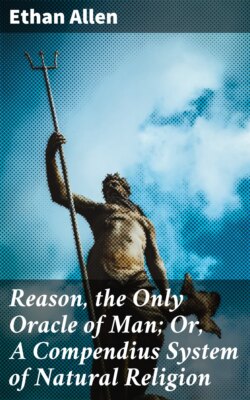Читать книгу Reason, the Only Oracle of Man; Or, A Compendius System of Natural Religion - Ethan Allen - Страница 16
На сайте Литреса книга снята с продажи.
SECTION II. OBSERVATIONS OF MOSES'S ACCOUNT OF CREATION
ОглавлениеTable of Contents
The foregoing theory of creation and providence will probably be rejected by most people in this country, inasmuch as they are prepossessed with the theology of Moses, which represents creation to have a beginning. "In the beginning God created the heavens and the earth." In the preceding part of this chapter it has been evinced that creation and providence could not have had a beginning, and that they are not circumscribed, but unlimited; yet it seems that Moses limited creation by a prospective view of the heavens, or firmament from this globe, and if creation was thus limited, it would consequently have circumscribed the dominion and display of the divine providence or perfection; but if Moses's idea of the creation of "the heavens and the earth," was immense, ever so many days of progressive work could never have finished such a boundless creation; for a progressive creation is the same as a limited one; as each progressive day's work would be bounded by a successive admeasurement, and the whole six days' work added together could be but local, and bear no manner of proportion to infinitude, but would limit the dominion, and consequently the display of the divine perfections or providence, which is incompatible with a just idea of eternity and infinity of God, as has been argued in the foregoing pages.
There are a variety of other blunders in Moses's description of creation, one of which I shall mention, which is to be found in his history of the first and fourth day's work of God: "And God said, Let there be light, and there was light; and God called the light day, and the darkness he called night: and the evening and the morning were the first day." Then he proceeds to the second and third day's work, and so on to the sixth; but in his chronicle of the fourth day's work, he says that "God made two great lights, the greater light to rule the day, and the lesser light to rule the night." This appears to be an inconsistent history of the origin of light. Day and night were ordained the first day, and on the fourth day the greater and less lights were made to serve the same purposes; but it is likely that many errors have crept into his writings, through the vicissitudes of learning, and particularly from the corruptions of translations, of his as well as the writings of other ancient authors; besides, it must be acknowledged that those ancient writers labored under great difficulties in writing to posterity, merely from the consideration of the infant state of learning and knowledge then in the world, and consequently we should not act the part of severe critics, with their writings, any further than to prevent their obtrusion on the world as being infallible.
